


|
|
|
I was reminded of a scene from Forest Gump over lunch with the Desais of Pawas one sunny afternoon. Forest and his friend Bubba are reminiscing about home with Bubba rattling off a never-ending list of shrimp food his shrimp-loving family make. The list I heard at the Desais�s was no shorter to say the least. Except this time it was mangoes. The Desais are Ratnagiri�s first family of mango. They�ve been in the business for 75 years and know all there is to know about the delectable fruit. The family own 500 hectares of lush mango tree-filled orchards across the length and breadth of the sleepy village of Pawas, a 30-minute drive from Ratnagiri, producing an impressive amount of mangoes per season. It�s no surprise then that the fruit forms such an intrical part of their daily diet.
Jayant and Vijay returned to oversee their orchards in Pawas and Vasant stayed on in Poona to manage the shop. In 1970 Jayant set up a nursery with approximately 1,000 mango, chickoo and coconut trees. In 1978 both brothers started an Alphonso mango pulp factory manufacturing under the name of �Vijay�. Jayant gradually incorporated the manufacture of several other mango products under the name �Amar�, along with the help of his sons Amar and Anand. Aside from spending hours in the orchards as boys, both also have formal training with Anand having a BSc in Horticulture and Amar a Masters in Post Harvest Food Process Engineering.
Come mango season and the entire Desai clan arrive in all their might with mango hungry stomachs not far behind. Jayant�s wife Shubhangi told us it wasn�t she fondly remembered wagers being made among her sons and their cousins as to who could eat the most mangoes in a single sitting. The benchmark for the brave and willing to eat was a whopping 20 mangoes. The fruit is still consumed just as fondly and aamras follows most lunches even today. The kitchen as Amar�s wife Aditi told us is a �women only� zone and mother Shubhangi, daughter-in-law Aditi and daughter Gauri are passionate about cooking. The Desais are vegetarians but the entire family has a sweet tooth. Breakfast is usually sabudana kichdi, uppma or poha followed by a typically Maharashtrian lunch of usal or sprouts, bhaji, amti � a daal-like curry, koshimbir or salad, yogurt, chapatti and rice. Almost no commuting mean the men of the house have the luxury of returning home for lunch. Dinner is what Aditi calls Chowpatty Food; lots of chaat and pav bhaji.
Had we arrived a few months later we were told, the smell of mangoes would have hung ripe in the air and we would have been hard-pressed to find anything other than mangoes in the kitchen. As Shubhangi explained, the list of mango foods they ate in season was endless from keiri amti � a raw mango curry � to amba raita, pickle, chutney, ice cream, milkshake, sheera, burfi, peda, mawa and juice. The adults in the house get through 60-70 mangoes per day but with no dearth in a steady flow of the fruit it�s no surprise. A 100-year old tree in their back garden alone produces up to 5,000 mangoes per season.
Amar summed up what being a Desai meant rather nicely as he explained how his wife Aditi wouldn�t get through a box of mangoes in a season before she married him but now ate the Alphonso the way it should. �She�s finally become a Desai,� Amar, very much the proud husband, declared.
|

Home Page
About the mag
Subscribe
Advertise
Contact Us
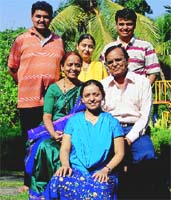 Lunch Under the Mango Tree, With The Desais
Lunch Under the Mango Tree, With The Desais
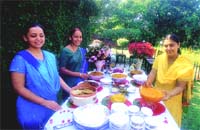 It all started when family patriarch Vasudeo Anant Desai planted a few trees at his farm in Pawas. In 1932 his son Ragunath took things a step further by setting up shop in Shanipar Chowk, Poona, selling mangoes from these trees door to door. As the family grew
so did the business with Ragunath�s sons joining in.
It all started when family patriarch Vasudeo Anant Desai planted a few trees at his farm in Pawas. In 1932 his son Ragunath took things a step further by setting up shop in Shanipar Chowk, Poona, selling mangoes from these trees door to door. As the family grew
so did the business with Ragunath�s sons joining in.
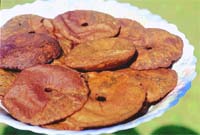 The business has continued to expand over four generations, with the Desais having won several awards in the field. Today they have over 12,000 fruit-bearing trees and the business remains a family one with Jayant, his brothers and their sons overseeing all dealings from cultivation to marketing, ensuring only the best in terms of fruit.
The business has continued to expand over four generations, with the Desais having won several awards in the field. Today they have over 12,000 fruit-bearing trees and the business remains a family one with Jayant, his brothers and their sons overseeing all dealings from cultivation to marketing, ensuring only the best in terms of fruit.
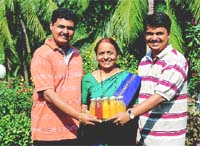 The day UpperCrust dropped in, lunch was a mixture of mango-based dishes and Konkan favourites. There was panha, a sweet and slightly sour drink made from keiri or raw mango, jaggery and sugar or salt to taste. This was followed by a jackfruit or phanas vegetable garnished with peanuts, sol kadi made with coconut milk and the abundantly found kokum that grows in the area, bhajani vada made from a variety of roasted grains and pulses, beetroot koshimbir, mixed vegetable curry, amti and amba daal, a tasty condiment consisting of gram daal, raw mango and green chillies. The Desais with whom Swami Swaroopanand lived with for 40 years had also prepared moong daal khichdi � the traditional offering served daily to devotees at the nearby Swaroopanand Temple. The meal of course was rounded off nicely with a hearty serving of aamras!
The day UpperCrust dropped in, lunch was a mixture of mango-based dishes and Konkan favourites. There was panha, a sweet and slightly sour drink made from keiri or raw mango, jaggery and sugar or salt to taste. This was followed by a jackfruit or phanas vegetable garnished with peanuts, sol kadi made with coconut milk and the abundantly found kokum that grows in the area, bhajani vada made from a variety of roasted grains and pulses, beetroot koshimbir, mixed vegetable curry, amti and amba daal, a tasty condiment consisting of gram daal, raw mango and green chillies. The Desais with whom Swami Swaroopanand lived with for 40 years had also prepared moong daal khichdi � the traditional offering served daily to devotees at the nearby Swaroopanand Temple. The meal of course was rounded off nicely with a hearty serving of aamras!
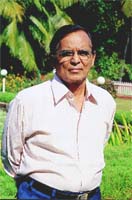 Aside from home consumption the bulk of the Desai mangoes are sent to their Desai Bandhu shops in Poona. One still located at the original address in Shanipar Chowk and the other in Kothrud. Their pulp is exported to Japan, the US and Singapore and the name is synonymous with quality, ordered by the likes of Atal Bihari Vajpayee, who had a standing order for two petis or boxes of mangoes per week. Although the orchards have a variety of trees, the Alphonso still reigns supreme and all their products including the pulp are made from this famous variety.
Aside from home consumption the bulk of the Desai mangoes are sent to their Desai Bandhu shops in Poona. One still located at the original address in Shanipar Chowk and the other in Kothrud. Their pulp is exported to Japan, the US and Singapore and the name is synonymous with quality, ordered by the likes of Atal Bihari Vajpayee, who had a standing order for two petis or boxes of mangoes per week. Although the orchards have a variety of trees, the Alphonso still reigns supreme and all their products including the pulp are made from this famous variety.